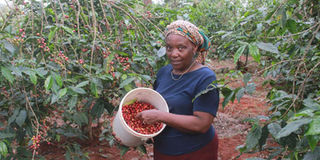Breaking News: At least 10 feared to have drowned in Makueni river
Nestle renews Sh40m coffee farmers’ deal

A dispute on whose role it is between counties and a national government agency on agriculture to license coffee agents could delay issuing of new permits starting July 1. PHOTO | FILE
What you need to know:
- Nestle, through its implementation partner Coffee Management Services Ltd, seeks to recruit 11,000 farmers in addition to the initial group of 37,000 growers.
- Roberio Silva, Executive director, International Coffee Organisation, says the Kenyan coffee industry needs to undergo an extensive revitalisation process adding that Nestlé’s Nescafé Plan initiative “is pointing to the right direction”.
Food and beverage manufacturer Nestlé Kenya has renewed a Sh40 million contract with Kenyan farmers for the next three years.
Nestle initiative aims at boosting coffee production in the country. Farmers under the project have more than doubled their yields thanks to disease-resistant coffee varieties.
Nestle, through its implementation partner Coffee Management Services Ltd, seeks to recruit 11,000 farmers in addition to the initial group of 37,000 growers.
It would also choose four coffee farmers’ cooperative societies to be part of the programme.
“The programme focuses on eastern and central Kenya. The first phase cost Sh30 million from 2011 to 2014,” said Linda Butler, Nestlé coffee sustainable manager and head of the global Nescafé plan.
“The period recorded an increase in quantity of production from 2.5 kilos per tree to between 7 and 10 kilos on average.”
The initiative gives farmers technical support to improve productivity, quality, and incomes.
Farmers’ cooperatives in Kiambu, Murang’a, Kirinyaga, Nyeri, Embu and Meru counties participated in phase one, recording between 70 per cent and 400 per cent increase in coffee production in the three-year period to 2014.
TRAINING FARMERS
Nestle also hopes to improve the current situation of low productivity in the areas that were previously not covered.
CMS managing director Kamau Kuria said production in some parts of Central Kenya dropped by 20 per cent in 2014 due to poor management of co-operatives.
“Some farmers are paid their dues late hence purchase of fertilizer delays, this interfered with farmers,” said Kuria.
Nestle however delivers training to farmers and their co-operative societies on how to handle the farming process and what varieties to plant.
More than 30, 000 farmers benefited from the first phase, about 30 demo plots were also established in 9 cooperative societies where training is conducted.
Currently, over 750 farmers are equipped with the knowledge to train others having been certified.
Roberio Silva, Executive director, International Coffee Organisation, says the Kenyan coffee industry needs to undergo an extensive revitalisation process adding that Nestlé’s Nescafé Plan initiative “is pointing to the right direction”.
“I believe in the value of Public Private Partnership I am impressed by the increase in coffee production, which of course results in an increase in farmer income, thus improving their livelihoods,” explained Silva who spoke at the sidelines of the 12th African Fine Coffee Conference and Exhibition being held at Safari Park Hotel.
According to Ms Linda Butler, renewal of the Nescafé Plan in Kenya also means that more women and youths will be empowered to take up roles in coffee and allow them to receive extended agronomist support.
Nescafé Plan is part of Nestlé’s Creating Shared Value (CSV) concept that states that for a business to prosper over the long term, the communities around it must also prosper. Nestlé creates shared value in three areas: nutrition, water and rural development.





